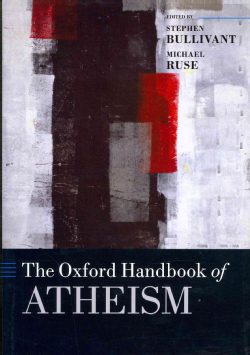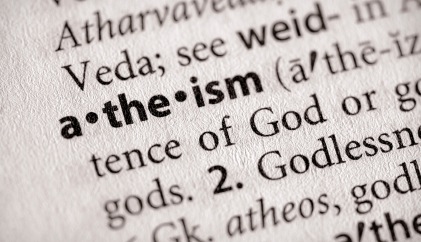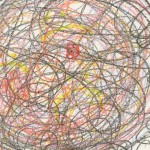How Should We Define ‘Atheism’?
by Stephen Bullivant
Filed under Atheism
NOTE: The following post is an excerpt from the recently released Oxford Handbook of Atheism (Oxford University Press, 2013), co-edited by atheist philosopher Michael Ruse and Catholic theologian, and Strange Notions contributor, Dr. Stephen Bullivant.
Atheism and Ambiguity
The precise definition of ‘atheism’ is both a vexed and vexatious issue. (Incidentally, the same applies to its more-or-less equivalents in other languages: Atheismus, athéisme,ateismi, etc.) Etymologically, atheism is derived from the classical Greek a- (normally meaning ‘not’ or ‘without’) and theos (‘god’). Its first extant appearance in English occurs in the mid-sixteenth century, as a translation of Plutarch’s atheotēs (Buckley 1987: 9). Even from its earliest beginnings in Greek and English, however, atheism/atheotēs admitted of a variety of competing, and confusing, definitions — often bearing no straightforward relationship to its strict etymology. While these lie outside the scope of the present chapter, some of the more interesting definitions and applications are discussed elsewhere in this volume.
Even today, however, there is no clear, academic consensus as to how exactly the term should be used. For example, consider the following definitions of ‘atheism’ or ‘atheist’, all taken from serious scholarly writings published in the last ten years:
- ‘Atheism [...] is the belief that there is no God or gods’(Baggini 2003:3)
- ‘At its core, atheism [...] designates a position (not a “belief”) that includes or asserts no god(s)’ (Eller 2010: 1)
- ‘An atheist is someone without a belief in God; he or she need not be someone who believes that God does not exist’ (Martin 2007: 1)
- ‘An atheist does not believe in the god that theism favours’ (Cliteur 2009: 1)
- ‘By “atheist,” I mean precisely what the word has always been understood to mean — a principled and informed decision to reject belief in God’ (McGrath 2004: 175)
Of course, these definitions share certain features: all regard atheism as relating, in a negative way, to a thing or things called ‘god’, and all but one describe this relationship in terms of belief. But beyond this, it is obvious that these authors are not all talking about the same thing at all. The first and second include gods; the final three specify only one (which the final two give a capital G). The fourth definition, moreover, restricts this scope even further. Definitions two and three regard atheism as simply being the absence of a certain belief; the rest, contrariwise, see it as implying a definite belief. Moreover, the fifth definition also demands a level of intellectual — and perhaps also emotional — conviction, over and above simple believing.
 Though our focus in this chapter is on scholarly usage(s), it is worth pointing out that everyday speech is no more monosemic. This is, perhaps, partly to be expected: after all, English is very much a global language, and is the native tongue of approaching 400 million people. Nevertheless, even relatively homogeneous groups often display a notable lack of uniformity. For instance, a 2007 study of over 700 students — all at the same British university, at the same time, with a clear majority being a similar age and from the same country — found that, from a list of commonly encountered definitions of ‘atheist’, the most popular choice was ‘A person who believes that there is no God or gods’ (Bullivant 2008). This was, however, chosen by only 51.8 per cent of respondents: hardly an overwhelming consensus. 29.1 per cent opted instead for ‘A person who is convinced that there is no God or gods’, 13.6 per cent took the broader ‘A person who lacks a belief in a God or gods’, and 0.6 per cent answered ‘Don’t know’. Thirty-five respondents, eight of whom had already affirmed one of the suggested meanings, offered their own definitions. These included:
Though our focus in this chapter is on scholarly usage(s), it is worth pointing out that everyday speech is no more monosemic. This is, perhaps, partly to be expected: after all, English is very much a global language, and is the native tongue of approaching 400 million people. Nevertheless, even relatively homogeneous groups often display a notable lack of uniformity. For instance, a 2007 study of over 700 students — all at the same British university, at the same time, with a clear majority being a similar age and from the same country — found that, from a list of commonly encountered definitions of ‘atheist’, the most popular choice was ‘A person who believes that there is no God or gods’ (Bullivant 2008). This was, however, chosen by only 51.8 per cent of respondents: hardly an overwhelming consensus. 29.1 per cent opted instead for ‘A person who is convinced that there is no God or gods’, 13.6 per cent took the broader ‘A person who lacks a belief in a God or gods’, and 0.6 per cent answered ‘Don’t know’. Thirty-five respondents, eight of whom had already affirmed one of the suggested meanings, offered their own definitions. These included:
- ‘A person who lacks a belief in supernatural forces, without suggesting that they might exist’.
- ‘Someone who denies the validity of using the word “God” to indicate anything (other than a concept) which might be said to “exist” ’.
- ‘A person who has no belief in any deity and finds that religion is not an important part of their life’.
- ‘Someone who isn’t a member of any religion that believes in one God’.
Once again, despite general similarities, it is clear that the word is used and understood in a wide variety of different ways, even in so relatively uniform a group. (Note too the introduction of wider concepts such as ‘religion’ and ‘supernatural forces’, rather than confining themselves to just God/gods, into these definitions.) Thinking more widely, it is also worth noting that both ‘atheism’ and ‘atheist’ can carry a considerable number of overtones and connotations, positive and negative: even among people agreeing on a given abstract definition, calling someone an ‘atheist’ might well communicate very different things in, say, McCarthy-era Dallas, post-communist Krakow, or twenty-first-century London.
The Babel Handbook of Atheism?
It is important to recognize that plurality of usage, as sketched above, need not imply that some scholars are right and others are wrong. Atheism simply possesses no single, objective definition: it can be used correctly in a number of related, sometimes overlapping, and often mutually exclusive ways. This is not necessarily a problem, so long as one is always clear how exactly each author is deploying the term. (There is also a valid case to be made for certain disciplines to use the word in their own, highly specialized senses.) That is not to say, however, that all definitions are equally useful: a too-narrow definition may inadvertently airbrush out all kinds of interesting potential data, while a too-broad one may capture a large number of ‘atheisms’ with few meaningful connections between them. Alternatively, a definition that is too idiosyncratic, or culturally bound, may obviate comparisons with other work ostensibly on the same subject. Furthermore, and quite obviously, the sheer lack of agreement creates a great deal of, at best, time-consuming effort, and at worst, hopeless confusion, for all concerned. There is, therefore, a great deal of utility to be gained from finding a generally agreed-upon, serviceable (if not perfect), scholarly definition of the word atheism.
The merits of this may be grasped if one imagines this Handbook — drawing together dozens of scholars, from widely diverse disciplines, and several continents — as a microcosm of the scholarly study of atheism. Without a ‘standard’ definition, outlined and explained in a chapter such as this, each contributor would need to explicate his or her own definition at the beginning of their chapter — or else, as happens all too often, their readers would simply have to infer quite how he or she is using the term. The reader, of course, would need to remember this definition throughout the duration of the chapter, before consciously relearning and re-remembering what would probably (but not necessarily) be a different definition for the next chapter. With different authors defining the term in different ways, like-for-like comparisons between chapters would become next to impossible: the ‘atheists’ whose psychological tendencies one learns about in one chapter may well be a different (and possibly mutually exclusive) set of ‘atheists’ whose demographic trends are charted in the next. Such a collection would not, it must be said, be without value: each individual chapter could well constitute an exemplary and illuminating piece of scholarship. Furthermore, every single one of its definitions of atheism might be perfectly valid (if not necessarily, for the reasons mentioned above, optimally useful): clearly and precisely defined, with a weight of historical usage behind it, and having sufficient consonance with popular usage. And yet, viewed as a whole, The Babel Handbook of Atheism would be a frustrating morass of contradictions and cross-purposes. Such, writ large, is the state of the scholarly study of atheism today.
Throughout this volume, by contrast, and unless otherwise stated, ‘atheism’ is defined as an absence of belief in the existence of a God or gods. As with most mainstream definitions of the term, it is simply the fruit of two basic decisions: the meaning and scope of a-, and the meaning and scope of -theism. Neither decision, of course, is either straightforward or uncontroversial. So let me explain, explore, and defend each of them in turn, while giving special attention to the question of utility.
a- is for…?
According to this definition, a- signifies a simple absence, or lack, or ‘state of being without’. In Greek grammar, this usage of a- is called a ‘privative a’ (or alpha privativum/privans), and features in such English words as amoral, asexual, anarchy, and anaerobic. Hence anaerobic respiration occurs in the absence of oxygen, but it is not, in itself, necessarily opposed to oxygen; anarchy is a principally state of lawlessness, rather than a state of denying or opposing the existence of laws (although individual anarchists, having elaborated an ideology from the concept, may or may not do just that). By analogy, atheism thus becomes an absence of something called ‘theism’. Importantly, it does not require a specific denial or rejection of, nor any animus against, this ‘theism’ — although, also importantly, it does not rule it out.
While this interpretation of atheism’s a- is indeed consonant with its Greek etymology, that is not, in itself, a strong reason for advocating it. Actual Greek usage, in fact, was itself rather variable. For example, Liddell and Scott define atheotēs as ‘god-lessness’ (1869: 27), citing the comment in Plato’s dialogue The Statesman about those ‘impelled to atheotēs and to vaunting pride and injustice by the drive of an evil nature’ (308e; quoted from Hamilton and Cairns 1961: 1081). While this is indeed an instance of alpha privativum (being ‘without’ god in the sense of being ‘godless’ or ‘ungodly’), the meaning intended is evidently a moral one. The same is, for example, also true in Aeschylus’ Eumenides when Orestes is described with the adjective atheos (‘atheist’). However, atheos could also connote ‘one who denies or dishonours the God’ (as used of Socrates in Plato’s Apology), a sense that goes beyond a simple, privative absence of belief. Furthermore, irrespective of its Greek descent, atheism is now an English word, and has been in use for over four and a half centuries. There is a long tradition in English of understanding atheism’s prefix as demanding, not merely an absence of theism, but instead a definite rejection of it. (Hence McGrath’s definition, quoted earlier: ‘a principled and informed decision to reject belief in God’.) As noted above, this is arguably the most usual common-speech meaning (though it is far from ubiquitous), and it is well-represented in recent scholarly literature (among others, see: Baggini 2003: 3–4; Hyman 2007: 28–9; Cliteur 2009: 1; and Walters 2010: 171).
Nevertheless, and irrespective of any etymological arguments in its favour, a strong case can be made for preferring our interpretation on the basis of scholarly utility. Defining atheism as ‘an absence of...’ permits it to function as an umbrella concept, comprising a range of significantly related positions and phenomena. These may usefully be subdivided into different categories, at different analytic levels. It is common, for example, for advocates of this kind of definition to distinguish ‘positive’ (or ‘strong’/‘hard’) and ‘negative’ (or ‘weak’/‘soft’) varieties of atheism (Martin 1990: 464). On this schema — which the Handbook adopts — ‘negative atheism’ is consonant with our basic definition of an absence. It thus includes such positions as agnosticism (in both its classical sense of a specific belief that there is insufficient evidence either to believe or disbelieve in the existence of a God or gods, and in its more popular sense of not having made up one’s mind), and the view of some linguistic philosophers that the word God is literally meaningless (see Charles Pigden’s ‘Analytic Philosophy’). Any person who does not, at present, have a belief in the existence of a God or gods is thus a negative atheist. By contrast, a ‘positive atheist’ is someone who is not only without such a belief, but holds a specific belief (which may, of course, be held with varying levels of certainty or interest) that there is no God or gods. Clearly, anyone who holds that belief — unless they are very confused — thereby is also without a belief in God’s/gods’ existence. Thus positive atheism implies negative atheism, but not vice versa. Positive atheism too may be further subdivided into various kinds: Promethean antitheism, existentialist atheism, Soviet scientific atheism, New Atheism, and so on.
To adopt a zoological metaphor, it might be helpful to think of atheism as a ‘family’, divisible into two ‘genera’ (negative and positive), each made up of various ‘species’ (agnosticism, Promethean antitheism, etc.). This taxonomic approach to atheism permits exploration of a diverse range of stances and worldviews, united by their shared absence of theism. It encompasses, for example, the positive atheisms of the humanist Bertrand Russell, the existentialist Jean-Paul Sartre, and the Marxist Mao Zedong, but also the negative atheisms of the agnostic Anthony Kenny, the logical positivist A. J. Ayer, and some — but not all — of the secular ‘indifference’ of a large and increasing number of Westerners. It would also include any genuinely religious atheisms, as are sometimes identified in strands of Hinduism, Buddhism, and Jainism (though see Jessica Frazier’s, Andrew Skilton’s, and Anne Vallely’s chapters later in this Handbook). Needless to say, the great bulk of this (coherent) richness and diversity — and with it, the potential for illuminating comparisons and correlations — is lost if atheism’s prefix is understood exclusively in the sense of a rejection and/or denial. Of course, scholars are not obliged to take into account all of atheism’s ‘endless forms’, whenever they want to write about a particular ‘genus’ or ‘species’: positive atheism, for example, is and will remain a discrete and significant focus of enquiry in itself. Nonetheless, there is clear value in being at least aware of how one’s specific topic relates to the bigger picture. One positive result, for instance, may be to reduce the data-skewing tendency of some students of religion to bifurcate people into ‘religious believers’ and ‘convinced atheists’, as though there were no possibility of anything in between.
Not insignificantly, this way of defining a- has precedents in both the writings of influential atheist writers, and in key works in the philosophical and social-scientific study of atheism (e.g., Flew 1976; Smith [1979] 1989; Martin 1990; Hiorth 2003; Hwang et al. 2009; Eller 2010). Furthermore, given the benefits of finding an agreed-upon definition among scholars of atheism (as outlined in the previous section), its recent employment in another major, multi-author reference work — The Cambridge Companion to Atheism (see Martin 2007) — is a key point in its favour.
One final comment: it is important to note that this definition of a- in terms of an ‘absence’ is intended in a wholly value-neutral, non-pejorative sense. It is not meant to imply that there is something ‘missing’ in the atheist that he or she ought either to have or to be (which is, of course, a separate question entirely). However, the possibility of the definition being (mis)taken to have negative connotations is indeed a troubling one. One might, of course, substitute ‘a lack of belief in the existence of a God or gods’ as a direct synonym. This would, moreover, lend an elegant symmetry to the corresponding definition of ‘atheist’ as ‘one who lacks a belief in the existence of a God or gods’. However, lack is susceptible to the same, or worse, kinds of misunderstanding: describing something as lacking normally implies a deficiency. Unfortunately, absence genuinely does lack such elegant symmetry when applied to the definition of ‘atheist’, creating the decidedly tortuous ‘one from whom a belief in the existence of a God or gods is absent’. Instead, it would probably be best to choose ‘one who is without a belief in the existence of a God or gods’ (which, unfortunately, results in the ludicrous, cognate definition of atheism: ‘a “without-ness” of a belief in the existence of a God or gods’). On balance, ‘absence’ for atheism and ‘without’ for atheist, while far from perfect, are probably still to be preferred.
The Meaning(s) of -theism
In the above discussion of a-, I have been glossing -theism with ‘belief in the existence of God or gods’. Yet, as with its companion, this too is the result of a conscious — and contentious — decision. Whereas defining a- is largely a binary affair (either it is understood as meaning ‘without’ or ‘an absence of ’, or as signifying a specific denial), -theism admits of a far wider range of credible options. So let me explain what I do and don’t mean by defining it as I have done, while once again comparing it with (and defending it against) some of its recent competitors.
Obviously, this understanding of -theism is contingent upon the individual meanings of ‘existence’ and ‘God/gods’. Equally obviously, there is no space here to give comprehensive accounts of either of these ideas. It will be helpful, though, to make a few brief remarks about ‘existence’, before commenting in more detail on the crucial category of ‘God/gods’ — upon which, as one might expect, the greatest disagreements among definers of atheism have centered.
‘Existence’ is not, perhaps, overly problematic. That is not to say that the concept does not present interesting philosophical issues and problems, but these are not specific to our current concerns. Admittedly, there are also strands within Christian theology which might want to deny, or at least qualify, the claim that God ‘exists’ (at least in the normal sense that everything within the universe is said to exist) — the influential fourth- or fifth-century theologian Pseudo-Dionysius could write that God ‘falls neither within the predicate of nonbeing nor of being’ (Luibheid and Rorem 1987: 141), for example — but this is a technical issue, beyond the scope of the present essay. That said, in the interests of precision, it is important to underline the role of the word ‘existence’ in defining atheism. Frequently, the word is omitted, resulting in definitions of (a)theism in terms simply of ‘belief in God(s)’. While this is fine as a handy abbreviation, as it stands the phrase is ambiguous: it can mean either belief that there is a God or gods, or faith/trust in God or the gods (Lash [1992] 2002: 18–21). In the vast majority of cases, including here, atheism relates only to the former sense (although an absence of that would, of course, ordinarily imply an absence of faith too). The presence of the word ‘existence’ also rules out those who might claim to ‘believe in God’, but only in some figurative, or anti-realist sense — in the same way that an adult, while not believing that Santa actually exists, might insist ‘I believe in Santa Claus!’ in order to affirm a general commitment to the magic of Christmas. These too, being without a belief in the existence of a God or gods, are still atheists on our definition.
The proposed definition draws on a conventional distinction between ‘God’ (singular, capitalized) and ‘gods’ (plural, lower case). According to this, the former normally signifies the ‘genre’ of God traditionally worshipped in Judaism, Christianity, and Islam (the differences between or within those traditions notwithstanding): a supreme, personal, transcendent, omnipotent, omniscient, and omnibenevolent Creator. This is sometimes referred to as the ‘Judeo-Christian God’, or the ‘God of Classical Theism’. ‘God’ can and does, though, also refer to the supreme beings of other monotheistic religions or belief systems — e.g., Zoroastrianism, Sikhism, Neoplatonism — who may or may not conform precisely to the above description. Our second category of ‘gods’ is, however, rather harder to pin down: religious studies reference books are oddly reticent about giving a generic, non-tradition-specific definition of what a ‘god’ actually is. Certainly, most ‘gods’ are not simply multiple versions of the ‘God’ of classical theism. The Greco-Roman gods and goddesses, for example, are typically neither omnipotent, omniscient, omnibenevolent, nor transcendent (in the sense of being outside of creation). It may well be, in fact, that despite there being any number of widely accepted claimants of the epithet ‘God/god’—Nyami Nyami, Hera, Odin, Baal, Wakan Tankah, Pachacamac — there is no set of essential characteristics that all gods possess, and all non-gods do not. (Being immaterial, immortal, and possessing supernatural powers, for instance, are often also considered properties of beings not normally regarded as gods, such as demons or sprites. On this point, see below.) It may also be that our Western concept of ‘a god’ — arguably like ‘religion’ — is one that has been artificially foisted upon belief systems, and where it now sits uneasily. If so, then perhaps it would be best to adopt a Wittgensteinian ‘family resemblance model’ — such as has been proposed for defining ‘religion’ itself (e.g., Clarke and Byrne 1993) — for deciding what does or does not count as a ‘god’. This would acknowledge that there is no set of necessary and sufficient properties common to all putative ‘gods’ (thus recognizing the genuine ambiguities of the term’s real-world application), while preserving what is, after all, a useful and well-established concept.
The above considerations, while seemingly a little off-topic, are worth thinking about here. Partly because of the relative difficulties involved in defining ‘god(s)’ as opposed to ‘God’, some scholars insist on defining atheism solely in relation to monotheism, if not in fact, to one specific instance of it. Kerry Walters, for example, affirms ‘The God whose existence atheists reject is the deity worshipped by the three “Religions of the Book”: Judaism, Christianity, and Islam. [...] Each of them proclaims what’s come to be known as “the God of classical theism” ’ (2010: 17). And for Paul Cliteur: ‘Atheism is concerned with one specific concept of god: the theistic god. The theistic god has a name and this is written with a capital: God’ (2009: 3). Relatedly, one commonly meets the claim that atheism’s definition is always relative to whatever form of theism happens to be dominant. In the words of Gavin Hyman: ‘atheism defines itself in terms of that which it is denying. From this it follows that if definitions and understandings of God change and vary, so too our definitions and understandings of atheism will change and vary. This further means that there will be as many varieties of atheism as there are varieties of theism. For atheism will always be a rejection, negation, or denial of a particular form of theism’ (2007: 29).
Certainly, there is some truth to this claim: positive atheism, at least, frequently expresses itself in opposition to some specific understanding of theism. In times and places where Christianity is prevalent, it would be strange to expend much energy critiquing the Neoplatonists’ One or Pharaoh Akhenaten’s sun-god Aten. And nor is it surprising that Western proponents of positive atheism should now direct their attentions to Islam, as well as to their traditional target of Christianity. But the fact that prevailing theisms condition the focus and expression of certain types of atheism, need not mean that either they or atheism in general have no wider referent. Even when specific attention is understandably given to one type of theism, this is normally accompanied and motivated by a general disavowal of all gods. (By analogy, an opposition party normally expresses itself against the policies of the government. But it would be something of a stretch to claim that, say, the essence of the Labour Party — or socialism itself — is defined exclusively by ‘what the Tories are not’.)
The practical disutility of such a definition can, moreover, be easily grasped. If atheism is defined exclusively in terms of (say) the prevailing Abrahamic monotheism, then all non-adherents in that society — including huge numbers of other types of theists, both poly and mono — are thereby made ‘atheists’. But not even the proponents of such definitions, in practice, use the concept in so broad and unwieldy a way. Furthermore, it becomes meaningless to speak of ‘atheism’ in times and places where this kind of monotheism is basically unknown: depending on one’s understanding of a-, either everyone in ancient Athens was an atheist (in the negative sense), or nobody was (in the positive sense). But again, even those proposing such ethnocentric definitions of atheism still want to single out specific groups of ‘atheists’ in classical Greece (cf. Cliteur 2009: 5).
At the other end of the spectrum, there are those who, rather than restricting the scope of -theism to one specific understanding of God, wish instead to extend it to encompass all supernatural beings, forces, and phenomena. James Thrower, for instance, distinguishes ‘relative atheism’ (such as we have just discussed) from ‘absolute atheism’, which he regards as synonymous with metaphysical naturalism ([1971] 2000: 4). Other scholars, while not defining atheism in terms of naturalism, nevertheless regard the two as intrinsically linked. Kerry Walters, for example, asserts: ‘The worldview that undergirds atheism is one whose deepest core belief is that the natural world is all that there is’ (2010: 36). He continues:
"[A]ll atheists are both methodological and what might be called ‘ontological’ naturalists. They don’t just insist that scientific hypotheses must be kept free of occult explanations. They argue that scientific explanations are legitimate because there is nothing in reality that can’t be understood ultimately in material, physico-chemical, naturalistic terms. For the ontological naturalist, there is nothing apart from nature, and nature is self-originating, self-explanatory, and without overall purpose." (ibid.: 37)
But while this may well be the worldview of many atheists, especially Western positive atheists (though I expect many of these would wish to qualify the above précis), there seems no need to regard this as being the atheist worldview. There are vast numbers of people who have no belief whatsoever in anything ‘theistic’, and yet believe in other supernatural beings or phenomena (see Eller 2010: 3, 10). These may include impersonal ‘forces’ or ‘energies’, nature spirits, dead ancestors, demons, sprites, or ghosts, as well as any number of paranormal possibilities such as clairvoyance, telekinesis, messages from beyond the grave, etc. Furthermore, this applies both to the followers of multiple non-theistic world religions, as well as to wholly nonreligious, self-defining ‘atheists’ in the secular West (see, for example, Lois Lee’s chapter on ‘Western Europe’). These cases, atypical and anomalous as they may (or may not) be, are certainly interesting, and there would seem to be little gained by defining such people as non-atheists out of hand. The same applies, of course, to other attempts to identify atheism-in-general with a specific worldview (such as, most commonly, humanism). The words of George Smith are worth recalling:
"From the mere fact that a person is an atheist, one cannot infer that this person subscribes to any particular positive beliefs. One’s positive convictions are quite distinct from the subject of atheism. While one may begin with a basic philosophical position and infer atheism as a consequence of it, this process cannot be reversed. One cannot move from atheism to a basic philosophical belief, because atheism can be (and has been) incorporated within many different and incompatible philosophical systems." ([1979] 1989: 21–2)
Yet again, the primary concern here is utility: the study of atheism has far too much to lose in terms of richness and diversity by artificially excluding great sectors of those from whom a belief in the existence of a God or gods is absent.
Conclusion
The purpose of this chapter has been to explore the troublesome question of what atheism actually means, and to elucidate and justify the specific way in which it is being used in this volume. After introducing a number of background issues — the variability of word’s historical and contemporary usage, and the benefits of a generally agreed-upon scholarly definition — the task was broken down into its two constituent parts: the definition of a-, and the definition of -theism. It was argued that the former is best interpreted in the privative sense of an ‘absence’. This permits atheism to function as an umbrella concept, uniting a wide (but coherent) set of positions and phenomena. It is then possible to construct a systematic taxonomy of different types of atheism — the most basic division being between negative (simple absence) and positive (specific denial) — to bring clarity to further researches. The discussion regarding -theism was more complicated, with a broader range of credible options. Here it was argued that the central idea should be ‘belief in the existence of a God or gods’ (without needing to define too sharply what does or does not count as a ‘god’, a concept lacking a certain clarity in the field of religious studies). This steers a course between confining theism to only a specific form of it (e.g., Abrahamic monotheism), and needlessly coupling atheism itself to a particular metaphysical or ethical worldview. The resulting union of these two decisions gives us the following definition of atheism: an absence of belief in the existence of a God or gods. Since it has been a key contention in this chapter that the definition of atheism is to be guided by the principle of scholarly utility — and not least the extent to which it helps, or hinders, the pursuit of interesting and genuinely illuminating research — then this particular one can, to a significant degree, be judged by its fruits in the rest of this Handbook.
Purchase your copy of The Oxford Handbook of Atheism.
Related Posts
Note: Our goal is to cultivate serious and respectful dialogue. While it's OK to disagree—even encouraged!—any snarky, offensive, or off-topic comments will be deleted. Before commenting please read the Commenting Rules and Tips. If you're having trouble commenting, read the Commenting Instructions.













